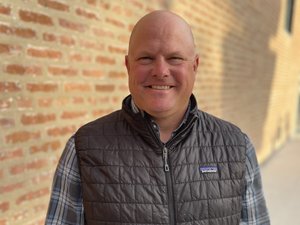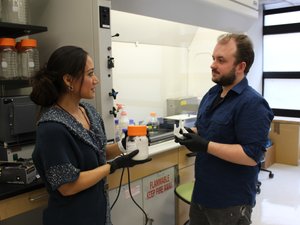It's your birthday, and you're celebrating by eating cake with your family at the dinner table. For a second your mind drifts to an earlier memory, the rolling hills of North Carolina. When you return to reality, there's a black spot in the center of your vision, and your hearing is muffled. You knock over a wine glass, and as your family mops up the mess they recommend that you see a doctor about your recent difficulties hearing and seeing. Later, in the doctor's office, you can hear your son tell the nurse to speak clearly, because you can't hear well. The doctor asks you to complete a cognitive abilities test, but you couldn't properly hear his instructions and your vision is so blurred you can't see what you're doing.
Then you take off the Oculus Rift headset.
These scenes comprise seven minutes in the life of "Alfred," a elderly man with hearing and vision loss. It's also the first project from University of Illinois-Chicago virtual reality startup Embodied Labs. Using VR tech, narrative filmmaking, and empathy-focused curriculum, the startup aims to create a tool for teaching medical students patient-centered care. Because, for at least seven minutes, the doctor can actually be the patient. In this case, Alfred (pictured above).
It's a radical exercise in empathy that hasn't been possible, until now. Though Embodied Labs is beginning with a film that depicts the experience of a geriatric patient (the need for quality geriatric care is rapidly increasing as baby boomers age), they anticipate their VR tech and empathy-focused education could help people better understand a host of medical conditions and multicultural experiences.
The idea to use virtual reality as a teaching tool came from the personal experience of founder Carrie Shaw, a current biomedical visualization graduate student at UIC. Her mother was diagnosed with early onset Alzheimers when she was 19. Shaw stepped in as a caregiver, but longed for a better way to understand her mother's symptoms so she could provide better care. Additionally, with a background in public health (which she studied at University of North Carolina-Chapel Hill) and multicultural experiences (she taught health education through the Peace Corps in the Dominican Republic), she saw how important it was to cultivate empathy.
"How can we get people into these experiences that they can’t access in any other way outside this technology?" she said. "I think that’s where this is really meaningful."
Over the last year, she found like-minded cofounders in head developer Thomas Leahy (who she met in a human-computer interaction class at UIC), filmmaker Ryan Lebar (who she connected with through Facebook when he posted he was interested in exploring VR filmmaking), and curriculum lead Erin Washington (who brings additional edtech experience).
Embodied Labs uses a combination of Oculus Rift and Leap Motion to immerse the viewer in the environment, and has the viewer interact with six scenes that stretch from the birthday party with family to a trip to the doctor's office. The viewer's actual hand gestures knock over the wine glass, and their hands shake as they attempt to connect dots on a cognitive ability test (see video below). This is a key differentiator for Embodied Labs--other medical simulation tech uses avatars or virtual anatomy labs.
The VR film, which is based on an actual case study used in medical training, creates a level of "embodied learning," said Shaw, an emerging idea in education that uses movement and human-computer interaction to drive deeper learning. And in pilot tests with educators and focus groups earlier this year, viewers not only struggled to see and hear, but they reported feeling embarrassed when they knock over the wine glass and patronized when the son speaks up for Alfred. Going beyond the feelings of physical impairment was key to address the different ways that people feel empathy.
"If you want someone to feel empathy for another person when they're embodying someone else, you don't necessarily know what it is that will make them feel connected to...Alfred," said Leahy. "It highlights the differences between people and how they can feel emotion for someone else through this experience."
Research on the initial film and curriculum won a top prize at UIC's Research Forum earlier this year. Next, Embodied Labs plans to sell the tech and curriculum to medical schools, and already UIC's College of Medicine has agreed to run it in their courses next year.
Of course there are some challenges delving into VR, particularly because the tech is still largely under development and has yet to reach a critical mass of users. Leahy and Shaw admitted it's going to require a lot of on-the-go updates, and working with schools that are ready to work with cutting-edge tech. But as tech develops, they anticipate the demand will only grow.








